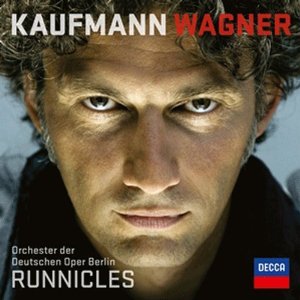|
|
|
|
|
|
|
|
|
Limelight Magazine, Apr 16, 2013 |
| By Clive Paget |
|
|
|
Wagner: Scales and Arias ***** |
| World-beating Wagner – faultless recital proves Kaufmann’s one heldentenor to rule them all. |
|
 In
the liner notes, Jonas Kaufmann recalls a moment from his childhood. His
grandfather sits at the piano, illustrated vocal scores of the Wagner operas
open before him, singing his way through every role – summoning the vassals
along with Hagen and “hojotoho-ing” his way to the top of Brünnhilde’s rock.
Thus did young Jonas learn of Lohengrin, Tannhäuser and the terrible tale of
the Nibelung’s ring. It’s been a sensibly cautious journey, but the
Munich-born tenor has recently moved into the heavier end of the German
repertoire. In
the liner notes, Jonas Kaufmann recalls a moment from his childhood. His
grandfather sits at the piano, illustrated vocal scores of the Wagner operas
open before him, singing his way through every role – summoning the vassals
along with Hagen and “hojotoho-ing” his way to the top of Brünnhilde’s rock.
Thus did young Jonas learn of Lohengrin, Tannhäuser and the terrible tale of
the Nibelung’s ring. It’s been a sensibly cautious journey, but the
Munich-born tenor has recently moved into the heavier end of the German
repertoire.
This is Kaufmann’s first all-Wagner disc and it’s a
thrilling experience. He starts with Die Walküre, but instead of
Winterstürme he opts for Siegmund’s far more interesting sword
monologue. In six glorious minutes, Kaufmann runs the gamut from resolute
hero to romantic dreamer and back. Listen to how he caresses Ein Weib
sah’ ich, wonnig und hehr, or how he comes elegantly off the voice for
Ist es der blick der blühenden Frau. Time and again he builds the
perfect climax with grace and passion. And then there are those mighty cries
of Wälse. In his notes he references Melchior as the benchmark
here, but by my timing he outlasts him by a good two seconds!
And so
it goes on. He lightens the voice for Siegfried’s forest monologue – more
burnished tone, more delicious word-painting. Rienzi’s prayer offers a
classy bel canto turn tossed off with panache. Tannhäuser’s narration is
riveting – not a sign of strain or wobble, and who can one say that about
these days? His Am stillen herd from Die Meistersinger is
ravishing – smooth yet ardent. Unusually, he gives us Wagner’s first
thoughts on Lohengrin’s In fernem Land, including the second stanza
subsequently cut by the composer. If he’d had Kaufmann, Wagner needn’t have
worried that it would outstay its welcome.
As a bonus we get a
gripping male interpretation of the Wesendonck-Lieder. By relating
the texts to Wagner’s personal situation at the time of composition, you
quite forget that the narrator should be Mathilde Wesendonck herself.
His partners throughout are Donald Runnicles and the orchestra of the
Deutschen Oper Berlin – a proper opera band. Their experience really pays
off with numerous arresting solos and an unerring sense of purpose from the
maestro. The engineering is outstanding too, full yet detailed. In short,
this is superb. I can’t think of a finer Wagner recital – ever.
|
|
|
|
|
|
|
|
|
|
|
|
|
|
|
|
|
|
|